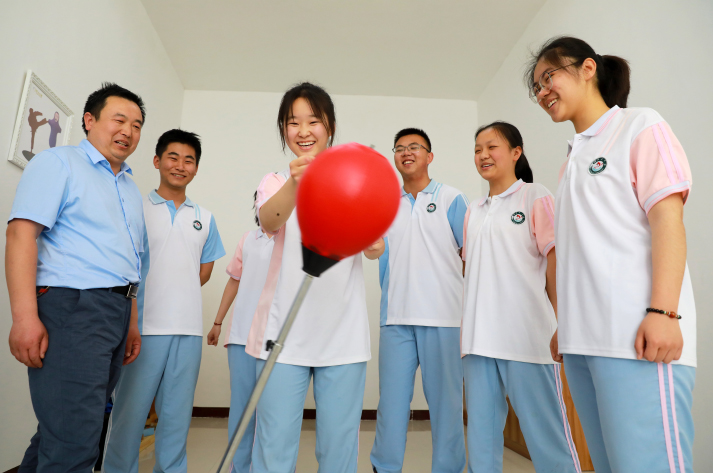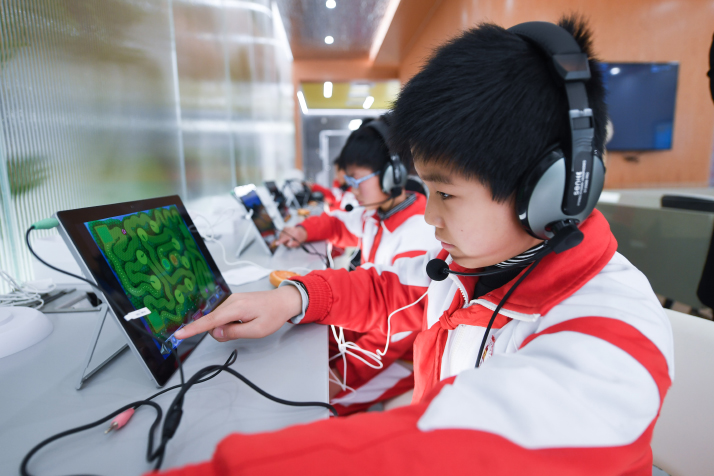| China |
| The mental health of children and adolescents deserves more attention | |
|
|
 Students let off some steam under the guidance of a psychiatrist at a high school in Huaibei, Anhui Province, on May 26, 2022 (XINHUA)
The missing of 15-year-old student Hu Xinyu since last October from a residential school in Yanshan County, Jiangxi Province, had once raised fears over kidnapping. But after the police confirmed on February 2 that he had committed suicide, leaving behind audio clips about his desire to end his life on a digital voice recorder, people have turned their attention to the real culprit—mental disorder. Local police said he was suffering from mental health issues related to poor grades and interpersonal relationships, and stresses from puberty. He had difficulty sleeping, woke up early, suffered from memory loss, emotional problems and feelings of guilt and helplessness, local police said, adding that he had shown clear signs of being world-weary and wanting to commit suicide. Hu's case has drawn national attention to the psychological wellbeing of children and adolescents.  Children learn to adjust their mood and gain more focus by playing games at the Psychological Health Service Center for Children and Adolescents in Jiaxing, Zhejiang Province, on March 3, 2022 (XINHUA)
High prevalence Depression among juveniles is prominent and has severely affected many young lives. A study, co-authored by Zheng Yi, a professor from Beijing Anding Hospital affiliated to Capital Medical University, and published in 2021, found a 17.5-percent prevalence of mental disorders among Chinese school children and adolescents aged 6 to 16, including depression, anxiety and insomnia. The results of a survey of about 60,000 people showed that the incidence of depression among adolescents was 24.6 percent in 2020, while that of severe depression was 7.4 percent. The Report on National Mental Health Development in China (2019-20), published by the Institute of Psychology under the Chinese Academy of Sciences in March 2021, noted that mental illnesses are caused by several factors, including pressures imposed by families, inappropriate parenting styles and influences from the surrounding environment. It pointed out that many parents are yet to become aware of the negative impacts they may be having on their children. High pressure Zhang Yonghua, a psychiatrist with the Hangzhou Hospital of Traditional Chinese Medicine, told Hangzhou Daily that the number of teenagers with mental health issues is increasing as academic pressure increases, their time for sleep and rest decreases and parents' expectations become higher. Zhang's office was packed with young patients as China's winter school vacation was coming to an end and the new term was about to begin. A 17-year-old girl surnamed Zhu had just finished a second counseling session with Dr. Zhang. Compared with when she came in for the first time, she had changed a lot, the doctor said. She was able to walk into the doctor's office by herself and talk about her concerns in her studies and daily life. However, Zhang said when Zhu first came in, she was reluctant to talk to the doctor and her mother had to talk to the doctor about her conditions on her behalf. Zhang said Zhu had been a happy and lively girl before she went to high school and had good grades. However, after entering a boarding high school, she became unwilling to talk to her parents when she came home during the weekends and would lock herself in her room. "At first her parents thought she was studying hard to get better grades, but then they found out Zhu's grades had actually gone down. They talked to her teacher and found that she seldom spoke to her classmates and had told her teacher she felt pressured, indifferent and meaningless," Zhang said. Zhu's parents were worried about her and took her to the hospital. Zhang diagnosed her with psychological problems and gave her both medicine and psychological treatment. Zhang also suggested Zhu's parents learn more about her feelings and try to understand her. Zhu has been seeing the doctor every one to two weeks and her conditions have improved a lot. Chen Yu, a psychiatrist in Shanghai, has interviewed more than 60 children over the past three years in an attempt to identify the cause of their mental health issues. Through the interviews, Chen realized the children were much less happy than their parents assumed. They often asked themselves questions such as "What is the purpose of studying?" and "Why do we live?" "It's regrettable that parents have failed to give feedback to these questions," Chen told Portrait, a monthly magazine. "The biggest disagreement between parents and children is that parents want their children to be obedient and hardworking and have high scores but they ignore the children's emotions and feelings," Chen said. Chen talked about a typical case of a high school student from Shenzhen, Guangdong Province, who had contacted her three days before taking the college entrance exam in 2022. The girl from Shenzhen said since the beginning of primary school, she had been told by her parents not to waste any time and to come first in all her exams. As a result of the pressure, she developed obsessive-compulsive disorder—a mental illness that causes repeated unwanted thoughts or sensations or the urge to do something over and over again—when she was in junior middle school. For instance, she would repeatedly check whether the personal information she filled out on her exam paper was correct instead of focusing on the exam questions. Chen said she found that most parents of children like the girl in Shenzhen have changed their own fate by getting into university and finding a decent job in cities. Such parents often equate their children's value to scores and tell their children to go to good universities, find good jobs and make more money. Chen said these parents usually don't allow their children to fail an exam. As a result, their children often feel worried before taking exams and, when they don't do well, they start doubting their abilities and losing confidence. Chen said children can go further when they are not judged by a single value system. "This age provides more possibilities for children. If they are not good at academics, they can choose other paths. As long as they can give full play to their advantages and find a way to survive, they're on the right track," Chen said. The way out Zhang said parents, schools and the wider community should pay more attention to juvenile mental health. He listed some signs of psychological issues to help parents identify the problems early on. If children's personalities change suddenly, for instance, an outgoing child becomes unwilling to talk to people or go out, or a child with a mild personality become irritable, they are likely to be suffering from mental health issues. Zhang suggested parents show less doubt and give more support and company for children when the latter exhibit psychological symptoms. "Parents should not focus only on children's academic performance but encourage them to take part in group activities to make more friends," he said. Dong Wuzhi, a lecturer at the Chinese Football College, Beijing Sport University, said regular physical activity can boost not only children's physical growth, but also their psychological health. While Zhang also wants to tell teenagers to look for ways to let off steam and avoid relying on electronic devices to ease anxieties, he did add, "When they can't solve their problems by themselves, they should not hesitate to seek medical help." (Print Edition Title: A Pressing Issue) Copyedited by G.P. Wilson Comments to jijing@cicgamericas.com |
|
||||||||||||||||||||||||||||
|